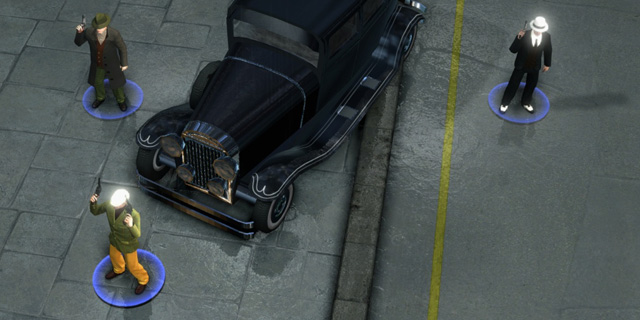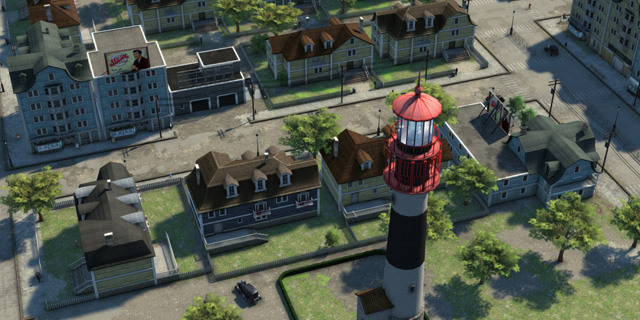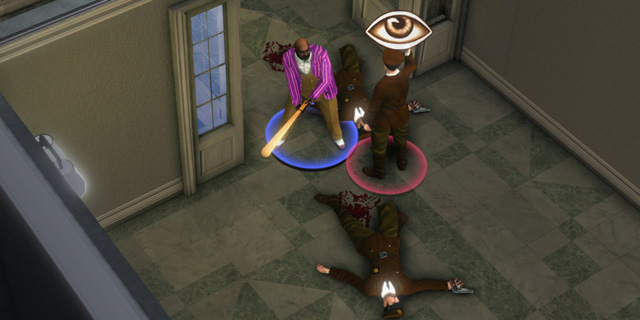
Haemimont Games, the modern steward of the Tropico franchise, seems like a natural fit for a mafia economic simulation; after all, running a corrupt island dictatorship seems like it’d be fairly similar. Of course, a re-skin of Tropico 4 wouldn’t be that interesting, and it’d be avoiding the most exciting (and, in real life, probably the least common) part: the shootouts.
Omerta: City of Gangsters, a game that has some loose connection to the browser-based MMO but doesn’t really express that anywhere, tries to mesh the Tropico-style economic simulation with Jagged Alliance-style tactical combat. (If you haven’t played either, which is possible, think SimCity and XCOM, but the formula is closer to my original examples.) As it’s set in the prohibition era, a main source of income is brewing and distilling drinks, as well as selling them at speakeasies. It’s not mandatory, though, if you want to avoid it; it takes a bit longer to get going in the early game, but you can also succeed by relying on protection rackets, money laundering and other seedy endeavors.

The mafia world
Omerta relies heavily on its story mode, and though there is a sandbox, it’s not as interesting. In the story, you choose your back story, then head from Italy to Atlantic City and work your way up. It’s silly. It’s super-stereotypical. It mostly works anyway.
This overworld management is not particularly challenging, and if anything, proves to be rather soothing. Seemingly taking cues from the vast world of social mafia games, you hire and send off mobsters on tasks, each taking a certain amount of time before they’re completed and the team member returns. Some are better at certain tasks; Masterminds do things faster, hitmen do the dirty work without raising “heat” from the police and burglars get more loot when raiding businesses and warehouses. Sometimes, it would be nice if this were more dangerous than it is, though.
There are also special jobs that present themselves through a menu, and they’re largely similar to the ones available on the map, but often prove to be more lucrative. (For example, you can sell beer for more or buy it for less with these opportunities, but sometimes the opposite is the case. And, if there isn’t enough supply or demand on the map, you may take these jobs anyway.) Each of these jobs is presented by a cast of characters in the game, each with their own predilections and behavior. J.J. always needs money, and can only sometimes make his loan payments on time. The rabbi tends to question the quality of your products and try to pay less when you deliver (which you can accept, or refuse and make him mad). The rich daughter is more than happy to overpay for liquor.

The Xbox 360 version
We reviewed the 360 version, which is a weird but welcome thing. Games like these usually aren’t available on consoles. The interface is streamlined and relies on shoulder buttons to bring up menus, but the same options are available. The visuals are noticeably weaker, but after the first hour or so, it doesn’t matter.
This is broken up by occasional combat stages, which happen at scripted points in the story or when raids and robberies go wrong. Technically, you can skip them; assigning team members to fight, then activating Auto-Combat has a success rate tied to the strength of your crew. You probably don’t want to skip them, though, because they’re interesting and don’t happen too often. Whether you’re attacking or defending, you generally spawn at one side of the map and have to seek out all enemies and kill them. (The exception: some maps have you rescuing team members from jail or kidnapping by rivals, and these just have you freeing them and escaping.)
Each gangster has a specialty; some are snipers, some are close-range, crowd-control pistol users and some just run in with a baseball bat. With the exception of that last one, you generally try to stay in cover all the time, and sometimes that’s not possible. It’s frustrating, maybe, to have to run across a room unprotected, but it adds a bit of risk to a game that needs it. Most attacks stop your movement, so the best course of action is to find a hiding spot and start firing, even if that means you’re further away and have a smaller chance of hitting. There are also special attacks with effects, like ignoring cover or causing bleeding damage, and every one can be “aimed” for one extra action point to help with accuracy. You can also add “perks” to characters as they gain experience, making them stronger at the things you use them for most.
Omerta does have some technical issues that hold it back from time to time. We had glitches cause the music and voice-overs to loop back on themselves at an irregular pace, as well as selections that just didn’t register and menus popping up and down while you try to use them. Also, in tactical maps with two waves of enemies, there’s no indication that the game detects when you’re done with the first wave, so sometimes you just have to end turns for a while until the game decides it should spawn the rest of your foes.
This is not a polished, full experience, and with some more time, it could have been something truly special. As it is, though, Omerta: City of Gangsters still manages to be relaxing mafia fun, and has a formula that will pass hours of your day in a blink.
Pros: Interesting hybrid strategy, nice perks mechanic
Cons: Stability issues, monotonous stretches



















